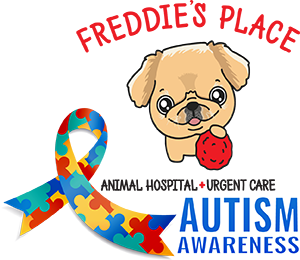What Lurks in Your House that Could Poison your Pet?
The third week of every March is National Animal Poison Prevention week. It’s amazing how different the animal body is from their people counter parts. Things humans consider “food favorites”, “eye catching decorations”, or “natures beauty” are, in reality, items that could be potentially deadly to your pet. #FreddieSez took this great opportunity to research the most common poisons, some related symptoms and some other facts surrounding what is considered “hazardous” to your fur kids.
In nearly all cases, pet poisoning is accidental and happens without the owners knowledge until symptoms start to appear, or some evidence is found. Imagine the fear, guilt and immediate panic you would feel in that situation. Most poison cases could be avoided by knowing the what, where and why of items that could make your fur family sick.
The Top Five causes of poisoning in DOGS are;
Food Poisoning
The “three C’s” leads this list of no-no’s when it comes to human food for your dog. Contrary to most beliefs, a little chocolate is not fatal to the largest percentage of dogs. This, in no way, means you should share a brownie or Kit Kat bar with your furry best friend. Even small amounts of chocolate can cause vomiting, diarrhea, cardiac issues, tremors and seizures. A large amount, in rare cases, could be fatal.
Other items to watch out for when giving your dog table food are onions, garlic, grapes, artificial sweeteners and certain nuts. Consider what is in the scraps you share from your snacks and if your dog decides to help themselves to a large portion without your knowledge, there could be life altering issues.
Alcohol Poisoning
As tempting or funny as some people find sharing a six pack, or a taste of their favorite adult beverage, with Rover, those urges should be ignored. Dogs are more susceptible to the effects of alcohol than their owners. There is currently no known antidote or cure for canine alcohol poisoning. Your vet could use certain medications to help reduce the toxic buildup in the system, but that is not always the case.
Although the danger level for alcohol consumed is measured by a dogs weight, even as little as half a beer, a ¼ bottle of wine, or two shots of hard liquor could cause dangerous levels in the stomach and bloodstream of your dog.
Household Products Poisoning
Household cleaners, bathroom sprays, deodorants, perfume or cologne, scented candles or seasonal decorations, pest strips, garage chemicals sitting in pans or buckets, dryer sheets, batteries, feminine products, countless other everyday items that are seemingly harmless can turn into a potential poisoning hazard for your dog. Just like with human kids, it would be nice if Scout could tell the difference between great smelling and safe things AND smell good items that enhance your homes environment… but that task falls on the watchful eyes of pet parents. Consider what household products you put out. in your home, at what height or access point, and if your fur buddy is crafty or athletic enough to help themselves.
Plant Poisoning
Flowers are beautiful additions to any home, indoors and out. Who doesn’t like a window or backyard garden for fresh fruits and veggies? Those things are Americana 101 and part of a large percentage of households in our country. However, to keep your dog safe, try to avoid their access to certain plants.
Sago palm, Tulips, Aloe plants, Wild Mushrooms that pop up in your yard, Azaleas, Oleander, Foxglove and Philodendron lead the list of plants that are bad news for your dog. While the majority of these are not deadly, they can cause diarrhea, vomiting, heart issues, stomach pain, weakness, depression, and other “not so nice” symptoms. Things like grapes, garlic and onions are among the food crops to plant with a keen eye for dog snackers.
Medication Poisoning
Here’s a simple rule… DON’T GIVE YOUR DOG YOUR MEDICATION! Unless prescribed by your veterinarian, avoid the temptation of home remedies, and don’t listen to trends or advice from social media or friends. People drugs can cause horrible side effects in your dog. Pepto, Tylenol, lotions and creams for skin irritation, A.D.D. meds, anti-depressants, even petroleum jelly/menthol rubs… all are no go’s. And yes, if they are on the list, somebody has dosed their dog with it! Various symptoms can show and some can be fatal. Why risk it? See a professional and get a dog appropriate medication.
If you do get dog meds from your vet, read the dosage and usage instructions. Flea/Tick topical medications are potentially poisonous if ingested. If you have more than one dog, it’s not uncommon for one to lick the medication off the back of another, opening the door to poisoning by association. Only use the Rx for the dog it was prescribed for. Different dogs react differently, size, weight and breed come into play, as well.
If you’re a recreational drug user and you decide it would be fun to involve your pooch in your high… you don’t need to own pets. That may be harsh but, it’s along the same line as taking illegal drugs with your teenagers in your home. Your habit doesn’t need to become an addiction for your dog.
The Top Five causes of poisoning in CATS are;
Very similar but in a different order: Medication, Food, Alcohol, Household Items, Plants. The same rules and items to watch for would apply in most cases, with these additions…
Medication Poisoning
The rules are the same for cats and dogs, don’t give over the counter meds designed for people. High on the cat list of no-no’s are all pain relievers (Motrin, Tylenol, Advil). Oddly enough, cats can overdose on Vitamin D. Vitamin D can be found in certain plants, yeast, some cat foods brands and rodent poisons. Read labels and be wary of Vitamin D in foods you cook or scraps you share.
Food Poisoning
Add things like leeks, chives, spoiled or moldy food, and salt. Cats have a lower tolerance level for the onion/garlic/leek/chive family of foods, salt impacts their systems differently than with dogs and they don’t seem to have the nose and taste to tell if foods are out of date or spoiled, like most canines show.
You’ll see similar symptoms, like vomiting/diarrhea, depression, lack of eating, lethargy, temperature, difficulty breathing or dehydration.
Alcohol Poisoning
Cats tend to be sloppy drunks. They will wobble when they walk, have diarrhea and vomiting spells, drink water excessively, urinate often, show signs of disorientation. In small amounts, cats will often just sleep it off. However, if you find that your cat has been tipping the bottle, keep a keen eye on them for signs of advancing symptoms. Much like a drunk being pulled over by the police, your cat is not going to tell you the actual amount they’ve drank.
Household Products Poisoning
These lists are very close between dogs and cats, but the number of cat poisonings with household products is much less than with dog counterparts. Additions to the list are a high number or pest control product poisonings (you are what you eat and MICE are what some cats eat), and seasonal salt poisons (rock salt or other non-safe deicers). Cat roam, winter salts and salt residues get on their feet and legs. Cats are notorious self-maintainers, so they lick the dangerous chemical salts. There are pet-safe alternatives to rock or deicers that you could consider if you have feline friends or family.
Plant Poisoning
It’s a longer list with similar items and key additions like daffodils, certain ivy’s, marijuana dried or edibles, diffenbachia, Spanish Thyme, and Yew. Cats like to chew plants, and they tend to chew more often and with a different zest for the flavor than their dog companions. Be sure you know the plants you choose are kitty cool.
If I suspect poisoning in my fur kids, when do I panic, and what do I do?
Listen, it’s your baby and when you find them out of sorts and you’ve uncovered evidence of an accidental poisoning event, the natural reaction is to “grab and go” to the veterinarian. If it’s after hours, and it seems like it always is when they have an unexplained illness, you find the local Emergency Vet and head there. Our knee-jerk reaction is that no amount of money is too much to assure our pets are treated and cured. This is true, most of us would do anything for our fur kids… but if we STOP, collect the evidence and details, assess the situation and CALL FIRST, often you find the situation is a “wait and see” or “treat at home”. Avoiding the cost and unneeded stress of a vet visit is always recommended, if logical.
Consider these facts and gather this information prior to calling or rushing to a vet’s office:
What is the likely substance that caused the poisoning?
How much did my pet ingest?
How long has it been since they ingested the item(s)?
What is my pet’s breed, existing medical conditions or history?
What symptoms are they showing, how long have they been having those symptoms, have they been progressively worse?
Name and phone number of your everyday wellness veterinarian (if you’re calling an Emergency or Urgent Care Hospital)
Regardless if you’re phoning or going straight to the facility, this information is key to helping the doctors with diagnosis and treatment.
The best course of action is to calm down, gather the information and evidence, call in advance and have an adult conversation with a professional prior to going to the facility. In the end, if you save time, money and stress on the animal with a phone call, it’s well worth your time.
That’s our 4-1-1 on National Animal Poison Prevention Week. We hope we uncovered some details, gave some helpful hints, or dropped a little knowledge that you found helpful. Having safe and healthy pets in our homes is the ultimate goal for any fur family.
If you enjoyed this quick read, search through our previous blog entries in our archives for more tips, details and surprises. The crew at #FreddieSez takes our task to inform and educate as an important mission for this blog, so we sincerely hope you’ll stop back again next week.
From all of us in Freddieville, thanks for stopping by. Have a healthy, happy and pet filled week ahead. #FreddieSez





Leave A Comment